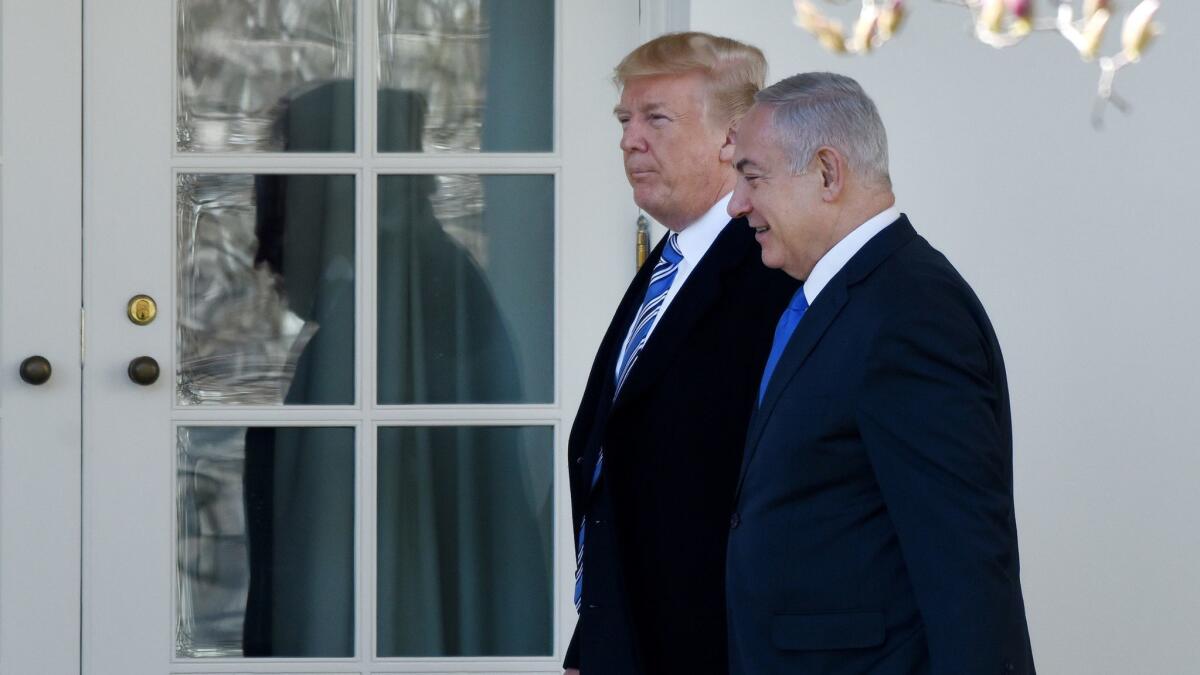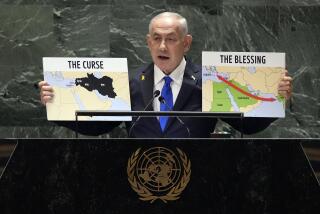Emboldened by Trump, Israel’s Netanyahu suggests a tough new approach to the Palestinian territories

Reporting from Jerusalem — Israeli Prime Minister Benjamin Netanyahu started the week with a statement that in the past might have provoked an international outcry: “The ‘occupation’ is nonsense,” he said, referring to 51 years of Israeli military rule over Palestinians in the West Bank.
In a single sentence, Netanyahu appeared to dismiss a legal and moral issue that has shaped most of the public discourse relating to Israel for more than half a century.
For the record:
9:40 a.m. Nov. 8, 2018An earlier version of this article incorrectly said that the United States was the only Western nation to move its embassy to Jerusalem. Guatemala also has done so.
Speaking to members of his party’s parliamentary caucus, Netanyahu elaborated on his provocative assertion. “Huge states have conquered and replaced populations, and no one talks about them,” the prime minister declared.
International law defines the territories won by Israel in the 1967 war with Arab neighbors as occupied lands, and the West Bank is administered by an arm of the Israeli army, not by civilian institutions.
Yet as jarring as Netanyahu’s statement may have sounded, many longtime observers called it a natural progression of Israeli policies that are playing out as well in the prime minister’s dealings with the outside world.
For critics of Netanyahu, such as Hagai El Ad, executive director of the anti-occupation organization B’Tselem, “the only novelty” of dismissing the political reality of the occupation “is the fact that the prime minister is now spelling it out.”
“It is yet another example of closing the gap between what Israel does and what it says,” El Ad said in an interview.
Both inside and outside Israel, critics and admirers of Netanyahu, who has been prime minister for almost 10 years, believe he has been emboldened by his close alliance with President Trump, discarding once-unquestioned diplomatic tenets.

In the past year, Trump and Netanyahu have cemented a strong alliance, embracing mutual goals that have tested international norms and tattered ties with the Palestinian Authority.
Under Trump’s leadership, the United States has recognized Jerusalem as Israel’s capital and relocated its embassy to the contested city, a move that only one other Western nation, Guatemala, has emulated. It curtailed U.S. aid to Palestinians and halted U.S. contributions to the United Nations body that oversees humanitarian needs for thousands of Palestinian refugees.
Netanyahu appears bolstered by the Trump administration’s tough attitude toward the Palestinians, and the president signaled little intention to change that posture on the day after midterm elections that saw Democrats seize control of the House of Representatives.
“Nobody has done more for Israel than Donald Trump, and the nice part is that’s not me saying it, it’s Prime Minister Netanyahu,” the president told reporters in a lengthy, freewheeling news conference at the White House.
Trump’s ambassador to Israel, David Friedman, and Jared Kushner, his son-in-law and senior advisor, whom he appointed to direct the peace efforts, have long histories of supporting Israeli settlements in the West Bank. The settlements are considered illegal under international law and have been criticized by past U.S. administrations, Democratic and Republican.
Power changes everything, and it changes our policy vis-a-vis countries in the Arab world.
— Israeli Prime Minister Benjamin Netanyahu
Israel won the territories after defeating the Egyptian, Syrian and Jordanian armies at the end of what it calls the Six Day War in 1967. The June War, as it is known in Arab countries, cost Syria the Golan Heights and Egypt the Gaza Strip and the vast Sinai desert.
Jordan lost East Jerusalem and the West Bank of the Jordan river, areas it had occupied since the British ended their oversight of the Holy Land, 19 years earlier.
In the early 1980s, in decisions never ratified by the international community, Israel annexed East Jerusalem and the Golan Heights. At the same time, in the context of a peace agreement with Egypt, Israel returned the Sinai desert. In 2005, Israel withdrew its settlements and permanent forces from Gaza
Netanyahu did not elaborate on the practical effect of his rejection of the term “occupation.”
Like Trump, Netanyahu in the last two years has accelerated a realignment of Israeli alliances away from traditional Western allies who have supported the Israeli-Palestinian peace process. He has openly pursued bonds with once peripheral nations.
In the summer of 2017, while attending a closed session of the Visegrad Group —the prime ministers of Hungary, Poland, the Czech Republic and Slovakia —Netanyahu was caught by an open mike harshly criticizing the European Union.
“The EU is the only international organization which predicates its relations with Israel — which provides it with technology — on political considerations,” he said. “We have special relations with China and they don’t care about political issues. … Russia doesn’t set political conditions and Africa doesn’t either. Only the European Union does — it’s crazy.”
In recent months, as the Middle East awaited an as-yet unseen Israeli-Palestinian peace plan Trump has promoted as “the deal of the century,” Netanyahu has hinted at major diplomatic breakthroughs with Persian Gulf nations that have boycotted Israel since its establishment in 1948.
In October, Netanyahu and his wife flew to Oman for an unannounced eight-hour visit, including a widely publicized banquet with its leader, Sultan Qaboos bin Said. A few days later, his minister of sports and culture was an official guest at an international judo championship in Abu Dhabi, where, in a highly unusual gesture, Israel’s national anthem was played in a country with which it has no diplomatic ties.
The notion that Israel’s path to solid ties with the Arab world passes through peace with the Palestinians appears to have been shattered.
“Israel is now a regional player,” said Yoel Guzansky, a senior fellow at Tel Aviv’s Institute for National Security Studies and the former head of the Iran and Persian Gulf portfolios at the Israeli National Security Council.
“Netanyahu has enjoyed certain successes, in part via the Trump administration,” he added. “He’s gotten some de facto support in the Arab world because of the support he has in the White House. That glass ceiling, that the Palestinian issue had to be resolved first and only then could Israel progress, has eroded significantly.”
Israel is feeling so self-confident in its new regional role that it has recently been juggling support for Saudi Arabia following the death of journalist Jamal Khashoggi with negotiations with a Saudi rival, Qatar, over an agreement easing the Gaza crisis.
“Under the current international climate,” El Ad said, Netanyahu no longer “has to invest in lip service to the peace process or keep up the pretense of pursuing a two-state solution.”
In the meeting with his party’s parliamentary caucus, Netanyahu outlined the philosophy guiding his more audacious approach to the Arab world as the Palestinian issue is left to fester.
“Power changes everything,” he said, “and it changes our policy vis-a-vis countries in the Arab world, and there are more countries currently on the way.
Within Israel, even on the political right, cautionary voices suggest that the occupation of Palestinian lands is a ticking time bomb. Former Justice Minister Dan Meridor, who is aligned with Israel’s right-wing, put it bluntly.
“Our rule over the West Bank is not democratic. It is military, and it is an occupation, even if we were forced into it by war.” Acknowledging the existence of “justified occupations” such as the American and Soviet occupation of Germany after World War II, he said Israel has to ask itself: “Where does this go?”
Tarnopolsky is a special correspondent. Times staff writer Laura King in Washington contributed to this report.
More to Read
Sign up for Essential California
The most important California stories and recommendations in your inbox every morning.
You may occasionally receive promotional content from the Los Angeles Times.










